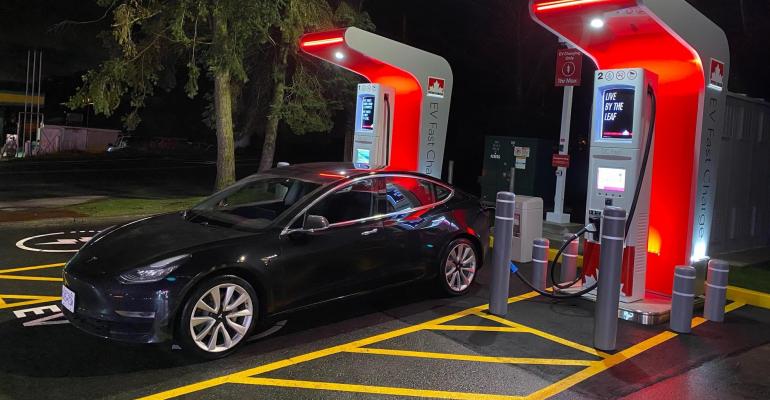OTTAWA – The Canadian auto sector wants its federal government to make major financial commitments to increase consumer subsidies for buying electric vehicles and build recharging systems, following imposition of EV purchasing mandates.
A policy released March 29 by Canada’s Liberal government (now formally backed by the social-democratic New Democratic Party) aims to achieve net-zero emissions in the country by 2050.
That includes a mandate to ensure at least 20% of new light-vehicle sales (including SUVs and pickups, which remain the dominant purchase in Canada) will be zero-emission vehicles by 2026, at least 60% by 2030 and 100% by 2035.
For this to be achievable, significant public investment will be required, say officials with the Canadian Automobile Dealers Assn. (CADA), Canadian Vehicle Manufacturers’ Assn. (CVMA) and Global Automakers of Canada (GAC).
The groups have released a plan to help Canada move toward a zero-emissions auto market and deliver on the mandates, which they criticize as ineffective without practical support.
“It’s better…not to mandate what consumers have to buy, but to incentivize non-emissions vehicles,” says Tim Reuss, CEO of CADA. The three associations want to see financial commitments written into the federal budget to be announced April 7.
In particular, the groups want a tripling in available federal-government consumer subsidies for EV purchases under the iZEV (Incentives for Zero-Emission Vehicles) scheme – currently C$5,000 ($4,000) per purchase of EVs, hydrogen-fuel-cell autos and long-range hybrids.
They want this increased to C$15,000 ($12,000) until EV prices fall to current internal-combustion-engine levels. Moreover, the associations want more of the 70 EV models available in Canada included.
 GAC CAO David Adams (pictured, left) says just 23 are currently iZEV-funded, with the vast majority being sedans and luxury models, and excluding SUVs and EV pickups (which are only hitting the market next year). With more than 80% of Canadian new-vehicle purchases being SUVs and pick-ups, offering subsidies excluding these models would be “trying to put square pegs into round holes,” Adams says.
GAC CAO David Adams (pictured, left) says just 23 are currently iZEV-funded, with the vast majority being sedans and luxury models, and excluding SUVs and EV pickups (which are only hitting the market next year). With more than 80% of Canadian new-vehicle purchases being SUVs and pick-ups, offering subsidies excluding these models would be “trying to put square pegs into round holes,” Adams says.
Also, the scheme needs to fund more expensive vehicles, Reuss suggests – raising an MSRP cap currently set at between C$45,000 ($36,000) and C$60,000 ($48,000), depending on passenger capacity.
In its March 29 announcement, the Canadian government said it would spend an additional C$1.7 billion ($1.36 billion) to extend the iZEV program.
The industry associations also are calling on the Canadian government to exempt EVs from a planned luxury tax, which drafts suggest would cover vehicles costing more than C$100,000 ($80,000). CVMA CEO Brian Kingston (pictured, below left) says, “We have got to get everybody into an EV, and that includes some of the more expensive models.”

In addition, the industry is calling on the government to ensure there are 4 million publicly accessible EV charging points nationwide – up from the current government proposals to add just 50,000 public chargers.
The associations also called for changes to planning and construction-standard rules so private chargers are installed in multi-unit residential buildings, home to 30% of Canadians, Adams says.
For EV charging to be as simple and reliable as pumping gas, there should be one public charger for every 10 EVs, preventing motorists from having to wait for a recharge, Kingston adds.
The Canadian government has pledged additional funding of C$400 million ($319.3 million) in spending on charging stations.
The GAC’s Adams says the government also should invest in hydrogen refueling, given fuel-cell vehicles will be an important part of the future commercial-vehicle mix.
Kingston also says Canada should establish technical recharging and EV standards to mesh with U.S. standards to ease cross-border journeys.
Will Canada achieve its mandates? Only if the industry’s plan is followed, Reuss says: “If this is to be successful, this has to be societal change.”
With investment announcements on EV and battery production flowing in Canada, Kingston notes: “I’m not concerned about EV supply. But can we convince consumers to make the switch?”
Petro-Canada national EV charging network.





